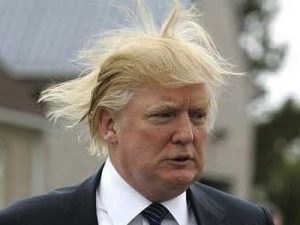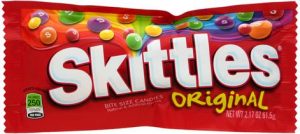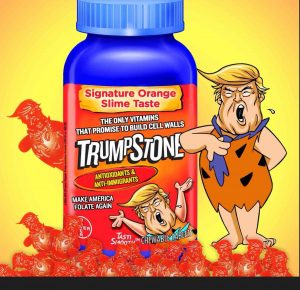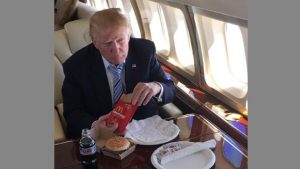After Samantha Allen of The Daily Beast had a chat with me the other morning, she did good journalism and went off on her own, and cited a Trumpism: He likes to eat fast food because “at least you know what they’re putting in it.”
 Katherine Purgatorio-Howard wishes her father knew what was in the mousse he ate at Trump’s Castle in October 1989, three months before he died.
Katherine Purgatorio-Howard wishes her father knew what was in the mousse he ate at Trump’s Castle in October 1989, three months before he died.
“It was six figures,” she told The Daily Beast of the settlement her mother reached with the Atlantic City property over the mousse, which New Jersey health officials identified as the source of a salmonella outbreak. “But it didn’t make my father un-dead.”
Last Thursday, the Trump campaign issued—and then quickly deleted—a rant against the “FDA food police,” listing it as one of several “specific regulations to be eliminated” in his new economic plan. Among other things, the campaign whined about the Food and Drug Administration’s standards for “farm and food production hygiene,” safe cooking temperatures, and even “dog food.”
But these are the exact safety measures that help prevent foodborne illness outbreaks like the one that affected the Purgatorio family in 1989. In fact, the Trump business empire has a long and illustrious history of food poisoning cases and safety violations.
According to a 1991 Associated Press report, Kathleen and Thomas Purgatorio, then in their sixties, ate the “salmonella-tainted mousse” at a restaurant called Buffet by the Sea in Trump’s Castle Hotel and Casino on Oct. 16, 1989. Kathleen felt sick afterwards, Purgatorio-Howard recalls, but nowhere near as ill as her father who she told The Daily Beast “went from walking into the hospital to being in intensive care on a ventilator in a coma.”
“He was in critical care from October to December,” Purgatorio-Howard recalled. “We brought him home. We kept him in the living room in a hospital bed. He was in distress the whole time and then, in January, he went back to the hospital and died.”
The following July, according to the AP, the newly-widowed Kathleen and three other plaintiffs sued Trump’s Castle for “nearly $11 million” over the mousse, which the New Jersey Department of Health said in a report had sickened over 100 people—including the Purgatorios—over the span of four days in October 1989. Hers was one of six food poisoning lawsuits filed over the mousse around the same time, the AP reported.
 That same July, Trump told the New York Daily News that the Purgatorio lawsuit was “ridiculous” and refuted any link between Thomas Purgatorio’s death and the chocolate mousse.
That same July, Trump told the New York Daily News that the Purgatorio lawsuit was “ridiculous” and refuted any link between Thomas Purgatorio’s death and the chocolate mousse.
“If you write that story, there will never be a dime of money spent by my casinos in the Daily News again,” Daily News staff writer Salvatore Arena recorded Trump as saying in a phone interview. “And you can print that.”
Alan Kaplan, an attorney for Trump at the time, told the AP that Thomas Purgatorio’s death was due to a “pre-existing heart condition.” Purgatorio-Howard, now a New Jersey nursing instructor, told The Daily Beast that her father had previously had a heart attack sometime before the trip to Trump’s Castle but maintained that “his symptoms and his organ failure came from the overwhelming salmonella infection.”
Kaplan also told the AP that the salmonella at Trump’s Castle was due to bad eggs from a vendor. If that’s the case, perhaps stricter adherence to FDA “farm and food production hygiene” standards could have prevented the eggs from ever reaching the restaurant.
“People have to be protected,” Purgatorio-Howard told The Daily Beast. “You really can’t have less regulation.”
The case file for Kathleen Purgatorio’s lawsuit was ultimately disposed, according to court records. Purgatorio-Howard told The Daily Beast that the case was settled out of court for “hundreds of thousands” of dollars but could not recall the figure. Attempts to reach attorneys for both parties in order to confirm her estimate were unsuccessful.
The Trump campaign did not immediately respond to a detailed request for comment and the Trump Organization did not have comment at press time. The Atlantic City Licensing and Inspection Department told The Daily Beast that records from this time are no longer available.
But newspaper reports indicate that Trump’s food-related woes only continued in Atlantic City. In 1992, the AP reported that “Donald Trump’s properties have the worst track record for food-related health problems among Atlantic City’s 12 casinos,” citing statements made by city health officials. Between 1984 and that time, the AP noted, there were five salmonella outbreaks at Trump properties, resulting in several temporary closures.
“We find it highly unusual that most of our problems in Atlantic City have been associated with the Trump properties,” then-Atlantic City health department official Denise Nelson told the AP. “The physical part of the [establishments] is top-of-the-line but it all boils down to extremely poor food handling.”
The AP report states that “Sharon Pearce, a spokeswoman for the Trump Taj Mahal, disagreed with [Nelson’s] assessment, but refused to elaborate.”
In his now-retracted anti-FDA screed, Trump complained about “inspection overkill” but restaurant inspections like these can prevent deadly salmonella outbreaks. The CDC estimates that 19,000 people are hospitalized and 380 people die due to salmonella every year. A total of 3,000 Americans die from foodborne illness each year.
As Trump’s business empire grew, so did the list of food safety violations. In November 2012, the DJT restaurant in the Trump International Hotel in Las Vegas received a staggering 51 violations “including month-old caviar and expired yogurt,” according to another AP report.
Public records from the Southern Nevada Health District show that DJT was indeed closed on Nov. 2 of that year with 51 violations during a routine inspection, reopening later that day with only 6 violations.
But the sudden closure and reopening did not escape the notice of local news station KTNV, which bestowed the dubious honor of a “Dirty Dining” award on the restaurant.
“The DJT restaurant in the Trump hotel is described on its website as ‘elegant’ and ‘in a class by itself,’ KTNV investigative reporter Darcy Spears announced in her exposé. “It is indeed in a class by itself this week, receiving the highest number of demerits of all restaurants health inspectors visited.”
Spears went on to list the many expired foods that health inspectors found at the DJT restaurant, including veal stock, tomato sauce, caviar, cranberry juice, duck, yogurt, peanut dressing, and black bean chili. Spears further reported that inspectors found “eggs, cream, cut tomatoes, potatoes, and sausage” were being kept at “unsafe temperatures.” As the AP noted, they also found “no measures to destroy parasites in undercooked halibut and salmon.”
In last week’s anti-FDA rant, the Trump campaign specifically highlighted required “food temperatures” as an example of potential over-regulation.
DJT ultimately provided KTNV with a statement that said, “We take these situations very seriously and all adjustments were made immediately. DJT opened within a few hours that same evening. We greatly value our guests, and delivering an exceptional experience to them is our top priority.”
But one of the worst brushes with health inspectors hit Trump even closer to home. As The Daily Beast has previously reported, public New York City health department records show that the Trump Cafe and Grill in Trump tower received 45 violations during an ungraded inspection in October 2015. That’s counting five “critical” violations including unapproved shellfish, a lack of appropriate “metal stem-type” thermometers to check cooking temperatures, and unsanitary wiping cloths. Two months later, the Trump Cafe and Grill scored only 12 violations and received an “A” grade.
But this May, another ungraded inspection found “live roaches present in [the] facility’s food and/or non-food areas” of the Trump Cafe and Grill and determined that the restaurant was not “vermin proof,” meaning that there were “conditions conducive to attracting vermin to the premises and/or allowing vermin to exist.” One week prior to that inspection, Trump had tweeted a picture of himself eating a taco bowl prepared in that restaurant. Yum.
 Tweeting an image with the “Make America Great Again” logo, he compared Syrian refugees to poisoned Skittles:
Tweeting an image with the “Make America Great Again” logo, he compared Syrian refugees to poisoned Skittles:




